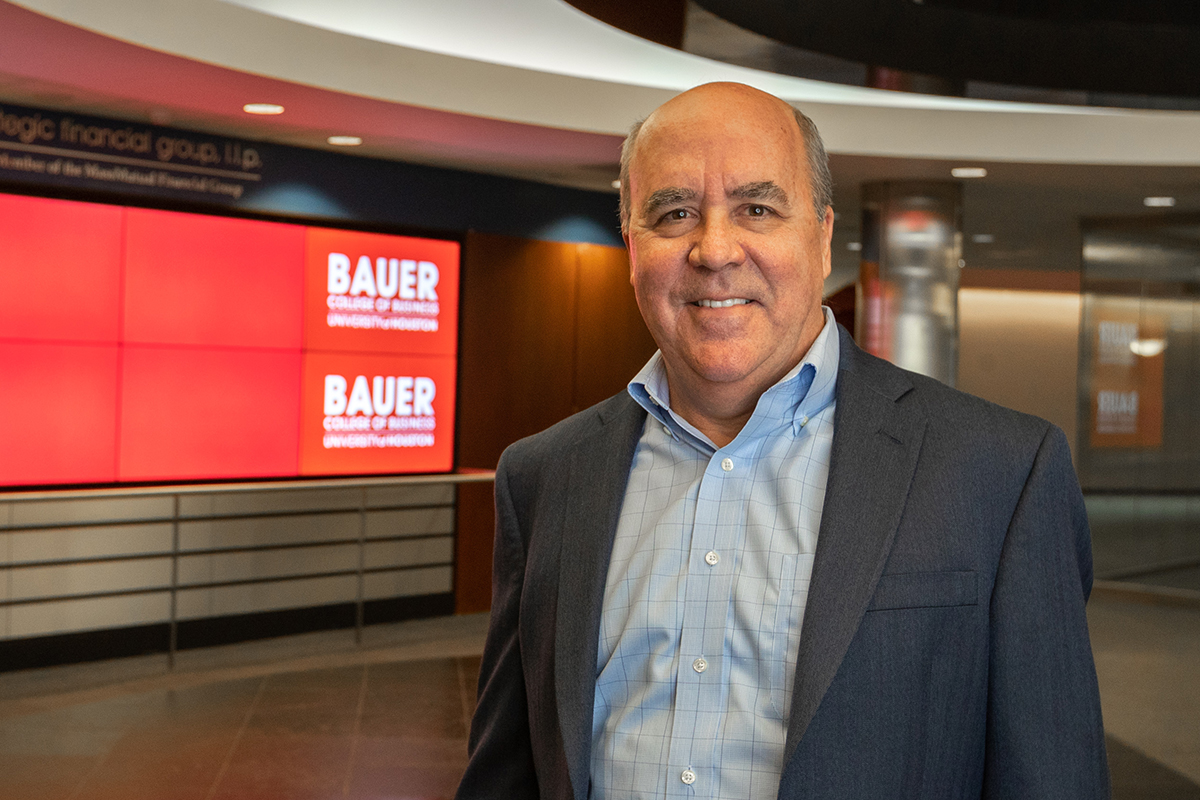Programs
Leading Global Energy
Bauer College Focuses on Industry Transition Through Gutierrez Energy Management Institute
For years, Bauer College has been home to a dynamic hub for energy education supported by industry involvement and expertise.
The Gutierrez Energy Management Institute, renamed in 2016 after receiving a generous endowment from energy executive and Bauer alumnus Joe Gutierrez, has delivered undergraduate, graduate and executive education in the energy sector since it was established in 2001.

GREG BEAN
GEMI EXECUTIVE DIRECTOR
This current phase of energy education at Bauer is very timely in terms of the fact that we are undergoing globally, an energy transition.
GREG BEAN,
GEMI EXECUTIVE DIRECTOR
But just as the energy industry is reinventing itself amid disruptors that include advancements in renewable energy technology, digitalization and concerns about climate change, GEMI is also evolving, adding and evaluating programs in order to better serve a new generation of students and a professional landscape in transition.
“This current phase of energy education at Bauer is very important in terms of the fact that we are undergoing globally, an energy transition,” said Greg Bean, an energy industry veteran who was recently appointed as GEMI's full-time Executive Director.
He added: “There are differing views about how rapidly that (transformation) is happening, but there is consensus amongst experts that it is happening, and that has significant implications for our students, for the industry and for Houston.”
Convergent factors include technology developments in renewable energy sources like wind and solar, electrification of transportation, and the impact of megatrends such as digitalization and artificial intelligence on traditional energy operations. These are happening amidst emerging challenges with regard to the potential impact of climate change and increasing urbanization, Bean said.
“It is creating a great opportunity for Bauer to really get on the leading edge of the transition,” he added.
Industry feedback on growth sectors in both the traditional energy industry and Houston’s growing renewable energy industry, as well as university-wide data on student interests, will be used to align curriculum and ensure it is relevant.
“Students are obviously interested, as all young generations are, in things that are newer and more on the leading edge,” Bean said. “They’re also attuned to some of the challenges we have as a society and are interested in places where new industries and technologies can help that."

PRAVEEN KUMAR
CULLEN DISTINGUISHED CHAIRED PROFESSOR AND CHAIR,
DEPARTMENT OF FINANCE
“In addition, being in Houston, they also understand how big and complex the energy industry is today, and that the continued growth in oil and gas creates great opportunities in our traditional energy companies as well.”
Bauer students are a diverse, talent-rich resource for all types of organizations, Bean said, adding that GEMI plans to grow internship and consulting/research opportunities for undergraduate and graduate students. This fall, students are doing projects for the Center for Houston’s Future, a local non-profit focused on issues critical to the city’s long term future, as well as for an oilfield services company. Bean is also building awareness of Bauer student capabilities among energy companies that have not traditionally recruited across the different Bauer departments to increase the level of on-campus recruiting.
Bean is also expanding GEMI’s industry research and outreach events. GEMI has increased the frequency of its popular symposium series to twice a year, most recently with a symposium on U.S. Energy Infrastructure and Investment. Through a partnership with UH Energy, GEMI has launched a White Paper Series, a collaboration of research reports examining pertinent topics for business, nonprofits and regulatory agencies developed by different UH colleges.
GEMI’s first white paper of the collaboration is a clear example of the way academic research and industry knowledge can benefit both while advancing ties between students and potential employers.
The paper, released this fall, identifies the significant advances in electric vehicle technology and other factors that are accelerating the likelihood of rapid penetration of electric vehicles in the light duty vehicle market. Written by Bean and senior professor of practice Christopher Ross, it captures insights from the April 2018 GEMI symposium and workshop that included high-level executives and thought leaders from the oil, gas, power and renewable energy sectors, as well as investment banks, think tanks and nonprofits. UH was represented by faculty from the business, engineering and law schools, as well as business school students.
GEMI was established by the late Dean Arthur Warga and directed for many years by Praveen Kumar, Cullen Distinguished Chaired Professor and chair of Bauer's Department of Finance. He remains GEMI’s Faculty Director and an active member of GEMI’s advisory board.
Bean is certain that Houston’s energy-rich infrastructure positions GEMI to be the premier energy business education resource and the preeminent academic/business energy center in the country.
“We have a unique advantage being here, three miles from the global center of energy, where industry executives, faculty, and students are able to interact with leadership so easily,” Bean said. He also noted the large presence of important energy-related industries including engineering and construction companies.
“Because we’re in Houston, we also have a large number of retired and semi-retired industry executives who we can call upon to help as adjunct faculty and mentors for our students interested in energy careers. And we have one of the most diverse student populations in the U.S., which is something very important to the companies that recruit here,” he added.
“With all these advantages, with focus and with more investment of resources, we can make GEMI and the Bauer energy education programs even bigger and better.”
